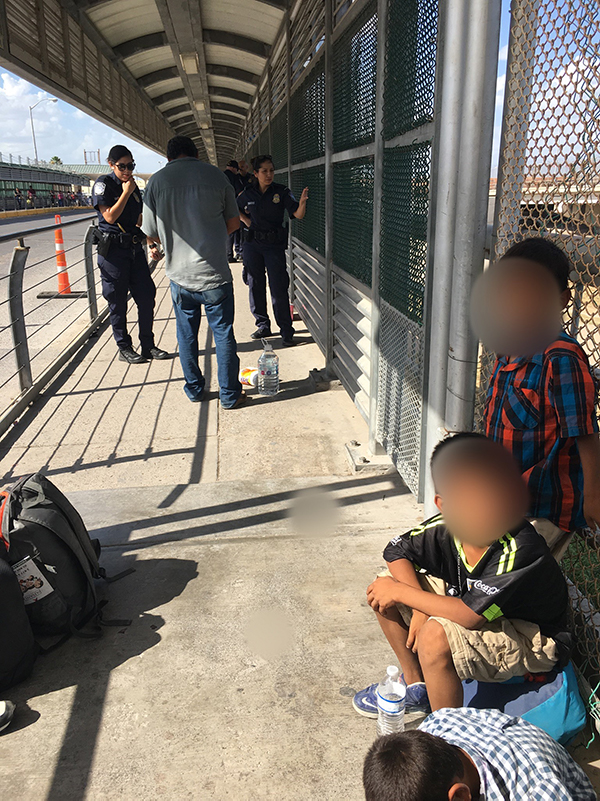J. Herbert Nelson seeks protection and care for unaccompanied children

Asylum-seeking family stopped pedestrian bridge in Mexico by U.S. Customs and Border Patrol - Summer 2018 Photo by Lenna Baxter
He [the scribe] asked him, “Which commandment is the first of all?” Jesus answered, “The first is, ‘Hear, O Israel: the Lord our God, the Lord is one; you shall love the Lord your God with all your heart, and with all your soul, and with all your mind, and with all your strength.’ The second is this, ‘You shall love your neighbor as yourself.’ There is no other commandment greater than these.” (Mark 12:28–31)
These are the most important commandments, to love God with all heart, soul, mind and strength and to love your neighbor as yourself. These may seem simple, and yet they are extraordinarily challenging, especially when faced with how to truly comprehend God’s gracious abundance and how we share that abundance with each other. How do we care for each other? Do we embrace the opportunity to carry each other’s burdens or do we turn our face away in shame?
The situation at the southern border of the United States is of great humanitarian concern, but we should be careful not to call it a crisis. When we see the border as a crisis, we give ourselves permission to respond with military might, deterrence measures and trauma-inducing methods. We imply that it is too much for us to handle. The real crises are the root causes that force families to make incredible decisions to seek dignity and protection in another place. At our southern border, we ask that policies be implemented that meet these individuals, families and children with compassion and humanitarian aid.
This is a moment when we can choose a different path. As people of faith in a church with a long history of welcome and refuge, we can urge decision makers to meet the challenge with compassion and mercy. We can urge that families stay united as they seek asylum in the United States. We can urge that children who do come unaccompanied be treated with great care and reunited with relatives quickly in the United States. We can urge that anyone who seeks refuge in the United States should have an opportunity to claim asylum and build their case in safety and not detention. This is our commitment to international law, to U.S. sanctioned law and to our understanding of our moral identity as God’s faithful.
These are the ways we seek to love our neighbor. These are the ways we strive to encourage the mercy and love of God’s kin-dom. These are the actions of a faithful people understanding that God’s justice and peace are for all. We should not feel burdened when we reach out to our siblings; we should feel liberated in the love shared between us. May we see these moments as opportunities to share God’s light with the world, because we witness God walking with them on their journey, too.

Reverend Dr. J. Herbert Nelson, II
Stated Clerk of the General Assembly
Presbyterian Church (U.S.A.)
The Office of Immigration Issues and Presbyterian Disaster Assistance are monitoring the situation at the border. Staff invite you to attend a webinar hosted by the Interfaith Immigration Coalition on Wednesday, March 24, at 5 p.m. ET/2 p.m. PT to learn more about the situation and how you can help. The webinar will be streamed on Facebook Live.



No comments:
Post a Comment